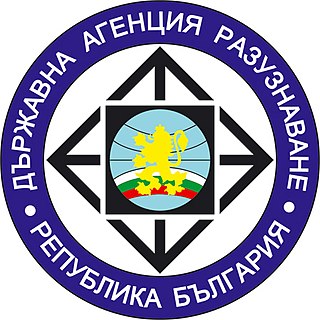
In espionage and counterintelligence, surveillance is the monitoring of behavior, activities, or other changing information for the purpose of influencing, managing, directing, or protecting people. This can include observation from a distance by means of electronic equipment or interception of electronically transmitted information. It can also include simple no- or relatively low-technology methods such as human intelligence agent and postal interception. The word surveillance comes from a French phrase for "watching over" and is in contrast to more recent developments such as sousveillance.
Military intelligence is a military discipline that uses information collection and analysis approaches to provide guidance and direction to assist commanders in their decisions. This aim is achieved by providing an assessment of data from a range of sources, directed towards the commanders' mission requirements or responding to questions as part of operational or campaign planning. To provide an analysis, the commander's information requirements are first identified, which are then incorporated into intelligence collection, analysis, and dissemination.

The Canada Border Services Agency is a federal agency that is responsible for border protection and surveillance, immigration enforcement and customs services in Canada. The CBSA is accountable to Parliament through the Minister of Public Safety and Emergency Preparedness

The Australian Criminal Intelligence Commission (ACIC) was formed to strengthen the country's response to crime affecting Australia. The agency has specialist investigative capabilities and delivers and maintains national information sharing solutions. The ACIC was established on 1 July 2016 following the merger of the Australian Crime Commission and CrimTrac.
The Canadian Forces National Investigation Service (CFNIS) is the investigative arm of the Canadian Forces Military Police.
Criminal Intelligence is information compiled, analyzed, and/or disseminated in an effort to anticipate, prevent, or monitor criminal activity.
The Criminal Justice Information Services Division is a division of the United States Federal Bureau of Investigation (FBI) located in Clarksburg, Harrison County, West Virginia. The CJIS was established in February 1992 and is the largest division in the FBI.
Financial intelligence (FININT) is the gathering of information about the financial affairs of entities of interest, to understand their nature and capabilities, and predict their intentions. Generally the term applies in the context of law enforcement and related activities.
The Terrorist Screening Database or TSDB is the central terrorist watchlist consolidated by the FBI's Terrorist Screening Center and used by multiple agencies to compile their specific watchlists and for screening. As of June 2016 the list is estimated to contain over 2,484,442 records, consisting of 1,877,133 individual identities. Approximately 1,600 nominations are suggested daily, 600 names are removed and 4,800 records are modified by the U.S. intelligence community. Approximately one out of twenty of the people on the list are U.S. citizens or legal permanent residents.
A government database collects information for various reasons, including climate monitoring, securities law compliance, geological surveys, patent applications and grants, surveillance, national security, border control, law enforcement, public health, voter registration, vehicle registration, social security, and statistics.
The counter-terrorism page primarily deals with special police or military organizations that carry out arrest or direct combat with terrorists. This page deals with the other aspects of counter-terrorism:
Artificial intelligence, defined as intelligence exhibited by machines, has many applications in today's society. More specifically, it is Weak AI, the form of AI where programs are developed to perform specific tasks, that is being utilized for a wide range of activities including medical diagnosis, electronic trading, robot control, and remote sensing. AI has been used to develop and advance numerous fields and industries, including finance, healthcare, education, transportation, and more.
Regional Information Sharing Systems (RISS) is an information-sharing program funded by the U.S. Federal government whose purpose is to connect databases from local and regional law enforcement so that they can use each other's data for criminal investigations.
Automated Trusted Information Exchange (ATIX) is a computer database containing homeland security and terrorist threat information, which is part of the U.S. government's Regional Information Sharing Systems (RISS) program.
The National Criminal Intelligence Sharing Plan (NCISP) is an intelligence-sharing initiative that links the computer databases of local, state, regional, tribal law enforcement agencies with those of the U.S. federal government.
Aboriginal-based organized crime (ABOC) is a term used to refer to Canadian criminal organizations which have a significant percentage of Aboriginal members. These organizations are primarily found in the prairie provinces, which tend to have areas with high concentrations of people of Aboriginal descent. ABOC is an important national monitored issue, as defined by Criminal Intelligence Service Canada.
In network theory, link analysis is a data-analysis technique used to evaluate relationships (connections) between nodes. Relationships may be identified among various types of nodes (objects), including organizations, people and transactions. Link analysis has been used for investigation of criminal activity, computer security analysis, search engine optimization, market research, medical research, and art.

The State Intelligence Agency (SIA) is a Bulgarian foreign intelligence service, which obtains, processes, analyzes and provides the state leadership with intelligence, assessments, analyses and prognoses, related to the national security, interests and priorities of the Republic of Bulgaria.




